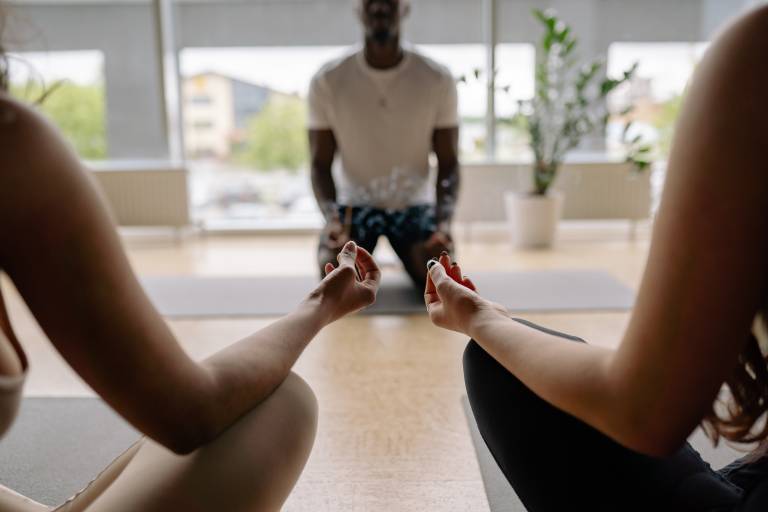Student wellbeing and meditation
3 March 2023
Meditation can help restore your balance when exams have you feeling stressed out and exhausted. A 3rd year student tells us how it has helped them.

It’s almost exam season and everyone is stressed… What to do?
Exams can make you feel drained and exhausted, but meditation is there to help!
Throughout my three years at UCL, meditation has helped me a lot to feel better and being less stressed. Although it can be hard to find the time to even breathe when you are doing a full-time degree or master, it is important to take some time out just for yourself and your mental wellbeing.
Engaging with your thoughts
This practice involves focusing on your mind for a certain amount of time, while paying attention to your thoughts but without engaging with them. This is often done in silence, or with the help of southing sounds. It can be for different reasons, such as religious or spiritual purposes or simply, to relax. Even if it is only a few minutes of mindful breathing, deeper breathing can bring clarity of mind.
There are different forms and types of meditation. The most common is mindfulness meditation. This consists in being aware of where you are and your actions in the moment, letting your thoughts pass or focusing on your breathing.
Transcendental meditation
Another way to mediate is transcendental meditation, you choose a phrase or a mantra that you repeat for 20 minutes twice a day, with your eyes closed and seated in a calm environment. Meditation can also help to form new life goals and letting go of negative emotions that may rise as a result of stress and being overwhelmed by the university study load. Among the various benefits of mediation, it can also increase IQ levels, if practised regularly. Meditation has also been found to decrease anxiety levels for students and could help many of us to feel better during such stressful times. Meditation can help to focus more and to be creative, as well as increased attention and sleep quality.
More generally, cognitive abilities are improved and strengthened.
Whether you are living in halls or sharing a flat, you don’t need much to meditate, it’s as simple as closing your eyes. There are also some very easy-to use apps if you want to follow a guided meditation video or podcast.
Doing meditation online
Meditation courses are also available online, and often, for free. One of them is called 'Headspace', and it offers a free trial. This is particularly helpful if you want to practice guided meditation, also referred to as visualization. It implies forming mental pictures in your head that will relax. It often includes a teacher, or a guide, and it is done through the senses, such as sounds or smells. It could be, for example, that thinking about a refreshing swim in the sea last summer and the memories you have with your friends playing at the beach brings you peace.
UCL Resources Another helpful way to do it is by joining the Yoga and meditation Club at UCL. The practice of yoga as a form of meditation is very common and already existed in ancient India. Through different breathing exercises and yoga poses, you can learn to be more focused on the moment and raise the awareness of your senses. It’s also a great way to improve your flexibility and your posture after a long day of studying.
The society and the classes at UCL are suitable for beginners and more experienced yoga students. The membership allows you to book classes and access student social, where you could people who like you, are interested in the practice of meditation!
There are many other forms of meditation that you could use to feel less stressed. Some, for example, are more spiritual than others. Insight meditation relies on the intention to transform your mind and to develop certain qualities that you may want to strengthen; wisdom, awareness...
Chakra meditation
Chakra meditation is based on energy centres and the power of spirituality in your body, with each Chakra representing a part of the body. The aim of this practice is to bring balance to every Chakra, also through colours or crystals. Similarly, Vipassana meditation, which is a very old form of meditation, brings attention to the physical senses of your body and the connectedness with the mind, thought to promote love and compassion.
Sometimes, even just taking the time to breath or reflect on the pattern of your thoughts can help you to be more grounded in the moment. Some people may prefer spending time with other people, praying, or practising a sport, to feel more recharged. In the end, it all depends on you, what you find useful to feel better and what you feel more comfortable doing.
How UCL Student Support and Wellbeing can help
If you need counselling, support, or just advice make an appointment with one of our caring wellbeing advisers or, if you are living in UCL accommodations, speak to your Student Resident Adviser.
3rd Year student who is studying for a BSc in Social Sciences at UCL
 Close
Close

